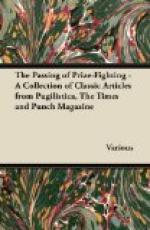***
When a penniless but oh, so ladylike “companion” goes to the Savoy in answer to a “with a view to matrimony” advertisement, what more natural than that the party of the first part should prove to be—not a genteel widower in the haberdashery business, but a handsome super-burglar of immense wealth and all the more refined virtues. True, he burgles, but his manly willingness to reform in order to please the lady shows that his heart was always in the right place, wherever his fingers might be. Then again the actual pillage occurs “off,” as they say, and the gentlemanly burglar, while not “occupied in burgling,” walks the stage a perfect Sir George Alexander of respectability. Do I hear you, gentle reader, exclaiming, like the Scotsman when he first saw a hippopotamus, “Hoots! There’s nae sic a animal!” It is simply your ignorance. The joint authors of This Woman to this Man (METHUEN) have selected him as the hero of their latest novel, so there he is. His combined annexation of the penniless beauty’s hand and her titled relatives’ objets d’art, her discovery that the splendid fellow she has idolised—it must be admitted, without any indiscreet investigation of his past—is a thief, and their final reconciliation in the rude but honest atmosphere of a New Mexico cattle ranch, are all included in the modest half-crown’s worth that C.N. and A.M. WILLIAMSON put forward as their latest effort. And nowadays you can’t buy much of anything for half-a-crown.
***
With commendable idealism Mr. SIDNEY PATERNOSTER considers The Great Gift (LANE) to be Love, and brings a certain seriousness to bear upon his theme. Hugh Standish, ex-newsboy, is at the age of twenty-five partner of an important shipping firm, as well as large holder in a book-selling business, which, in his leisure, he has so successfully run that it is “floated with a capital of L100,000 and over-subscribed” (incidentally rejoice, ye novelists!). At forty-six he is the whole shipping firm and a Cabinet Minister to boot. I would ask Mr. PATERNOSTER if such a man, who has, ex hypothesi, been so busy that he needs the sight of an out-of-work being tended and caressed by his faithful wife in a London Park to suggest to him that there exists such a thing as Love, with a capital L; needs also a later conversation with the same out-of-work to convince him that there is really something the matter with the industrial system (and wouldn’t it be a good idea to do something about it now one is a Cabinet Minister?)—I ask Mr. PATERNOSTER, I say, if this is the sort of man to take it all so sweetly when the girl of his choice prefers his cousin and secretary to him? I think not. Our author has woven his story without any reference to the play of circumstance upon his characters. I am afraid he has shirked the difficult labour of artistic plausibility, and I leave it to moralists to decide whether his excellent intentions and sentiments redeem this aesthetic offence.




